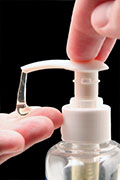- Drive to Be ‘Perfect’ Parent Isn’t Healthy, Survey Finds
- How Bad Was Beethoven’s Lead Poisoning?
- Big Rise in Emergencies Involving Synthetic Weed Among Kids, Adults
- How Mindfulness Could Help Folks Quit Opioids
- Candy Company Recalls Products Due to Salmonella Risk
- Study Finds Heart Damage in ‘Couch Potato’ Kids
- Helping Your Child Make Friends With a Child With Autism
- Planters Peanut Products Under Recall Due to Listeria Risk
- That ‘New Car Smell’ Could Be Toxic Carcinogens
- Gene Discovery Points to a New Form of Alzheimer’s
Rashes From Wipes, Liquid Soaps on the Rise


Allergic skin reactions to a preservative used in pre-moistened wipes and liquid soaps are on the increase, a doctor says.
“In the last two or three years, we’ve suddenly seen a big increase in people with this type of allergy,” Dr. Matthew Zirwas, director of the contact dermatitis center at Ohio State University’s Wexner Medical Center, said in a center news release. “For some patients, their rash has been unexplained and going on for years.”
The chemical preservative, methylisothiazolinone, is found in many water-based products, including pre-moistened wipes, cosmetics, liquid soaps, hair products, sunscreen, and laundry and cleaning products.
“Concentrations of the preservative have increased dramatically in some products in the last few years, as manufacturers stopped using other preservatives like paraben and formaldehyde,” Zirwas said.
The preservative can cause an itchy, painful rash that can include blisters and resembles a reaction to poison ivy. Areas of the body most often affected by an allergic reaction to methylisothiazolinone include: the buttocks and genitals from using moistened flushable wipes; the fingers and hands from handling the wipes; and the face from using soaps and shampoos.
“If someone suspects an allergy to moistened wipes, they need to stop using them for at least one month,” Zirwas said. “A week or two isn’t enough time.”
He added that manufacturers are aware of the problem and are trying to develop alternative preservatives.
More information
The American Academy of Allergy, Asthma and Immunology has more about allergic skin reactions.
Source: HealthDay
Copyright © 2024 HealthDay. All rights reserved.










